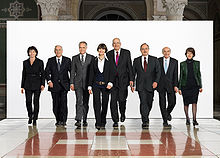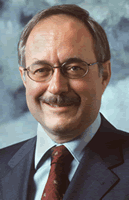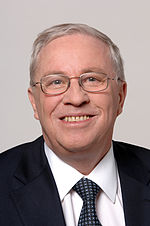Federal Council election 2007



On December 12, 2007, the general election of the Federal Council took place in Switzerland . The United Federal Assembly (both chambers of the newly elected parliament ) elected the Swiss government, the Bundesrat , for the term of office between 2008 and 2011. The seats were appointed individually in the order of the age of office of the seat holder. All previous Federal Councilors ran for a new term of office. In normal cases, incumbent federal councilors are re-elected. So far only three members of the government have not been re-elected, the last time after over a hundred years in 2003, when the CVP lost a seat to the SVP with its explosive candidate Christoph Blocher .
All Federal Councilors except Christoph Blocher were confirmed in their office. This lost the election in favor of Eveline Widmer-Schlumpf (SVP) as a demolition candidate of the center-left parties. The latter accepted the election on December 13, 2007.
Strategies of the factions
- SVP parliamentary group : The SVP committed itself to concordance in the run-up to the elections . It understands this to mean that the three strongest parties 2 and the fourth strongest party can provide a seat (which the other parties also recognize) and can determine this representative themselves (which, however, is neither customary nor accepted by the other parties). If one of her Federal Councilors were not re-elected, she threatened to withdraw from the Federal Council and join the opposition. After the SVP had first announced that it would elect the candidates from the other parties, it announced that it would not support those parties that Christoph Blocher did not want to vote for, namely the SP and the CVP .
- SP parliamentary group : The SP generally supported the concordance; the SVP-FDP block (4 seats) does not correspond to the share of the vote. Therefore, in the run-up to the CVP, she made an offer to return a second seat to her at the expense of the FDP. She also announced that she would not elect the previous SVP Federal Councilor Christoph Blocher. It was initially unclear whether she would choose another SVP candidate instead of him or a candidate from another party. On the eve of the election it was clear that the SP parliamentary group would re-elect all federal councilors except Christoph Blocher. On the morning of the election, the SP ported the Graubünden SVP government councilor Eveline Widmer-Schlumpf .
- CVP / EPP / GLP Group : In the run-up to the elections, different voices from the ranks of the CVP came forward. Party President Christophe Darbellay made himself available as a candidate if necessary. However, at the parliamentary group meeting on December 11, it was decided not to put up an official candidate against a previous Federal Councilor. However, a majority did not intend to support Christoph Blocher. Darbellay subsequently helped coordinate the election of Widmer.
- FDP parliamentary group : The FDP wanted to re-elect all previous federal councilors. After the parliamentary elections, FDP President Fulvio Pelli suggested that the SP, FDP and SVP should each withdraw their oldest Federal Councilor in order to enable the state government to be renewed on the basis of the Concordance. This idea didn't catch on.
- Green parliamentary group : The Greens claimed a seat in the Federal Council and officially ported Luc Recordon as a candidate for the seat of Christoph Blocher. This was seen by the majority as a tactical maneuver to put pressure on Blocher. After there was an agreement for the election of Eveline Widmer-Schlumpf, they supported this candidacy and withdrew Luc Recordon.
1st choice (seat of Moritz Leuenberger)
The first to stand for election was the senior Federal Councilor, Moritz Leuenberger , member of the SP and head of the Federal Department for the Environment, Transport, Energy and Communication (DETEC).
His re-election was undisputed in advance. He ran without an opponent and was re-elected with 64 abstentions and 4 invalid ballot papers, 246 ballot papers received and an absolute majority of 90, with 157 votes.
Since the SVP had previously announced that it would not vote for him, he could no longer achieve his high result from 2003.
| 1st ballot | |
|---|---|
| ballot papers distributed | 246 |
| ballot papers received | 246 |
| empty / invalid | 64/4 |
| valid total | 178 |
| absolute more | 90 |
| Moritz Leuenberger | 157 |
| Various | 21st |
2nd choice (seat of Pascal Couchepin)
Second, Federal Councilor Pascal Couchepin ( FDP ), Head of the Federal Department of Home Affairs (FDHA), ran for re-election.
Although the second seat of the FDP was not uncontested and Couchepin received poor results in polls among the population, his re-election seemed certain. It has been suggested that Couchepin would resign after his year as Federal President .
Pascal Couchepin was re-elected in the first ballot with the second best election result since 1991 in the Federal Council elections.
| 1st ballot | |
|---|---|
| ballot papers distributed | 246 |
| ballot papers received | 246 |
| empty / invalid | 13/2 |
| valid total | 231 |
| absolute more | 116 |
| Pascal Couchepin | 205 |
| Various | 26th |
3rd choice (seat of Samuel Schmid)
Federal Councilor Samuel Schmid ( SVP ), Head of the Federal Department of Defense, Civil Protection and Sport (DDPS) stood for re-election.
This too was undisputed.
| 1st ballot | |
|---|---|
| ballot papers distributed | 244 |
| ballot papers received | 244 |
| empty / invalid | 21/4 |
| valid total | 219 |
| absolute more | 110 |
| Samuel Schmid | 201 |
| Various | 18th |
4th choice (seat of Micheline Calmy-Rey)
Next in line was the 2007 Federal President, Micheline Calmy-Rey ( SP ), Head of the Federal Department of Foreign Affairs (FDFA).
Micheline Calmy-Rey was re-elected in the first ballot.
As with the election of Federal Councilor Moritz Leuenberger, most of the members of the SVP abstained.
| 1st ballot | |
|---|---|
| ballot papers distributed | 246 |
| ballot papers received | 246 |
| empty / invalid | 65/1 |
| valid total | 180 |
| absolute more | 91 |
| Micheline Calmy-Rey | 153 |
| Various | 27 |
5th election (seat of Christoph Blocher)
Federal Councilor Christoph Blocher ( SVP ), Head of the Federal Department of Justice and Police (FDJP), stood for re-election. In the first ballot, he missed a majority with 111 votes and was therefore not confirmed by parliament. Eveline Widmer-Schlumpf received 116 votes. Since the absolute majority was 120 votes, a second ballot was scheduled. In this, Widmer-Schlumpf achieved an absolute majority (122 votes) with 125 votes, which means that Christoph Blocher was not re-elected. After this result became known, the SVP requested that the elections be suspended, but this was not granted.
In the event that Christoph Blocher was not re-elected, the SVP had announced that it would withdraw from the state government. However, the already elected Federal Councilor Samuel Schmid had himself sworn in for a further term of office - as he had also announced in advance. Widmer-Schlumpf asked for a day to think about it and on December 13, 2007 declared the election to be accepted.
| 1st ballot | 2nd ballot | |
|---|---|---|
| ballot papers distributed | 246 | 246 |
| ballot papers received | 246 | 246 |
| empty / invalid | 6/2 | 4/0 |
| valid total | 238 | 242 |
| absolute more | 120 | 122 |
| Christoph Blocher | 111 | 115 |
| Eveline Widmer-Schlumpf | 116 | 125 |
| Various | 11 | 2 |
6th election (seat of Hans-Rudolf Merz)
Federal Councilor Hans-Rudolf Merz ( FDP ), head of the Federal Department of Finance (FDF), ran for re-election in sixth place .
Even with him, a vote in favor of a seat of the CVP or the Greens could not be ruled out, since the right of the FDP to a second seat was disputed. It was also conceivable that the SVP would now run against Hans-Rudolf Merz with Christoph Blocher (after he was not re-elected in the previous election).
However, none of these scenarios happened.
| 1st ballot | |
|---|---|
| ballot papers distributed | 246 |
| ballot papers received | 244 |
| empty / invalid | 8/3 |
| valid total | 233 |
| absolute more | 117 |
| Hans-Rudolf Merz | 213 |
| Various | 20th |
7th election (seat of Doris Leuthard)
Most recently, Federal Councilor Doris Leuthard ( CVP ), head of the Federal Department of Economic Affairs (FDEA), was up for election.
She was supported by all parliamentary groups except the SVP and was elected.
| 1st ballot | |
|---|---|
| ballot papers distributed | 245 |
| ballot papers received | 244 |
| empty / invalid | 49/4 |
| valid total | 191 |
| absolute more | 96 |
| Doris Leuthard | 160 |
| Christoph Blocher | 12 |
Election of the Federal Chancellor
Chancellor Annemarie Huber-Hotz (FDP) resigned. Therefore a new appointment was necessary. The following candidates were proposed:
- Corina Casanova , CVP candidate
- Nathalie Falcone , SVP candidate
- Markus Seiler , candidate FDP
Corina Casanova was elected with 124 votes in the first ballot. Nathalie Falcone and Markus Seiler received 64 and 52 votes, respectively. 246 ballot papers were received, two of which were blank and none were invalid. The absolute majority was 123.
Election of the Federal President and the Vice Federal President
After the election of the Federal Councilors, the Federal Assembly elected the Federal President for 2008. It was the turn of the then Vice-President Pascal Couchepin, whose deputy should have been Christoph Blocher if he had been elected. Federal Councilor Pascal Couchepin was elected Federal President with 197 votes. The election of the vice-president was postponed to the following day as it was not yet certain whether Christoph Blocher had definitely been voted out. After Widmer-Schlumpf had accepted her election on December 13th, Hans-Rudolf Merz was elected as the new Vice President with 193 votes.
Consequences in the SVP
The result of the election meant that the SVP parliamentary group expelled its Federal Councilors Eveline Widmer-Schlumpf and Samuel Schmid from the SVP parliamentary group. In other words, she no longer allowed her to attend the parliamentary group meetings. She announced that she did not feel represented in the government and that she would take an unconditional opposition course. But since not all exponents wanted to support this policy, the SVP faced an acid test. From a legal point of view, on the other hand, the faction exclusion had no significance, since, according to Article 61 of the Parliament Act, only members of the State and National Councils can be members of a parliamentary group and therefore federal councilors do not belong to any parliamentary group.
Consequences for the system of government
For the first time in the history of the Swiss Confederation, the largest parliamentary group did not support the government. With the well-developed popular rights ( popular initiatives , referendums ), the opposition would have strong means at its disposal that could block politics. However, the SVP was not very successful, which is why they tried to get Samuel Schmid to resign in order to end their opposition early. (see Federal Council election 2008 )
Individual evidence
- ↑ Tagesanzeiger.ch of December 9, 2007: Tactics divide the CVP ( Memento of December 12, 2007 in the Internet Archive )
- ^ Parliament's website ( memento of April 7, 2014 in the Internet Archive ). Accessed May 8, 2014
- ↑ a b c Results of the renewal elections on December 12, 2007. Swiss television, archived from the original on December 16, 2007 ; Retrieved December 12, 2007 .
- ↑ After the election is before the election - Eveline Widmer-Schlumpf wants time to think about it. Swiss television, archived from the original on December 14, 2007 ; Retrieved December 12, 2007 .
- ↑ Swissinfo.ch of December 13, 2007: "Eveline Widmer-Schlumpf accepts election"
- ↑ Widmer-Schlumpf is new Federal Councilor on espace.ch







